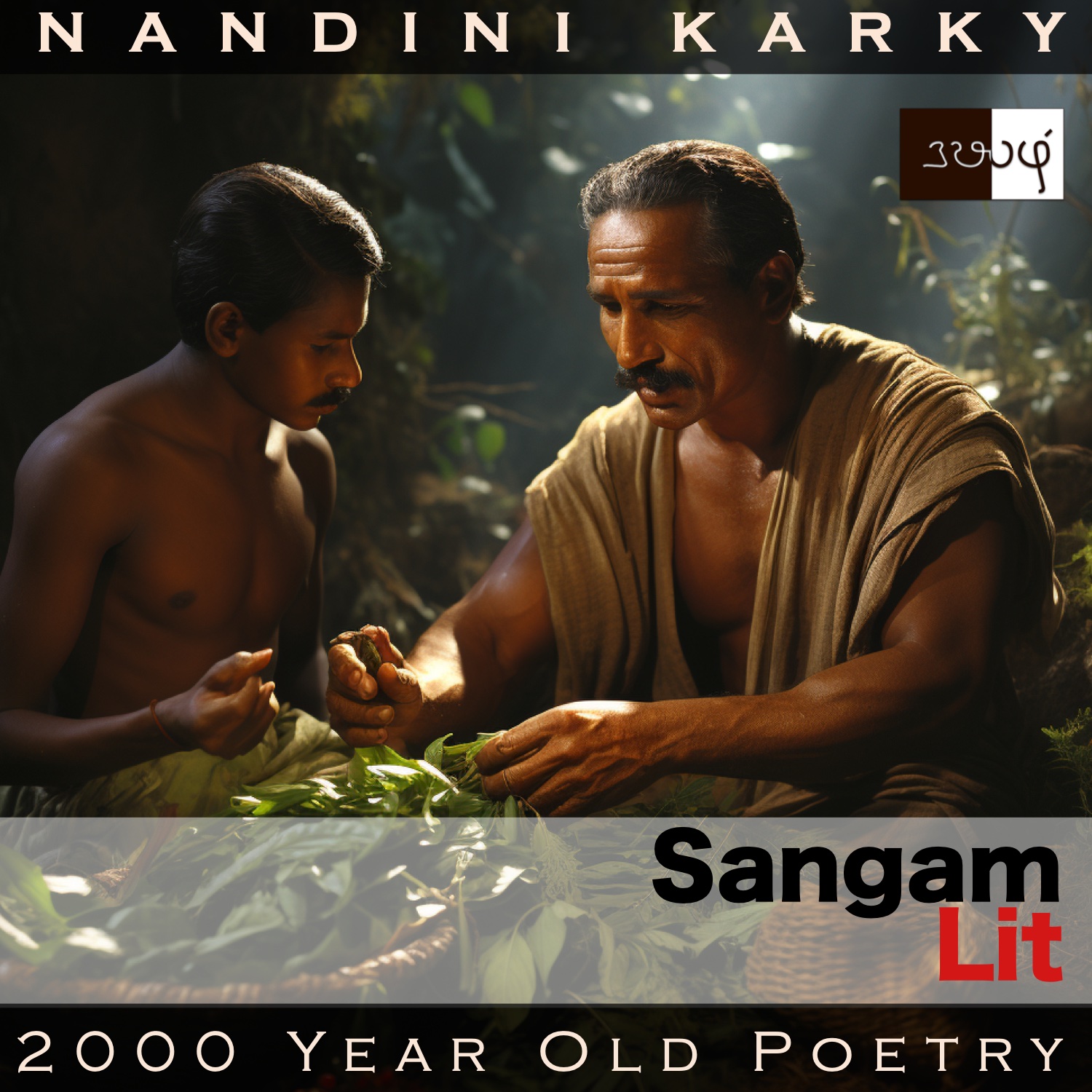Podcast: Play in new window | Download
Subscribe: Apple Podcasts | Spotify | Amazon Music | Android | iHeartRadio | Email | TuneIn | RSS | More
In this episode, we perceive what a poet truly expects, as portrayed in Sangam Literary work, Puranaanooru 197, penned about the Chozha King Kuraapalli Thunjiya Perunthirumaavalavan by the poet Konattu Erichaloor Maadalan Madurai Kumaranaar. The verse is situated in the category of ‘Paadaan Thinai’ or ‘Praise’ and speaks about integrity in the midst of poverty.

வளி நடந்தன்ன வாச் செலல் இவுளியொடு
கொடி நுடங்கு மிசைய தேரினர் எனாஅ,
கடல் கண்டன்ன ஒண் படைத் தானையொடு
மலை மாறு மலைக்கும் களிற்றினர் எனாஅ,
உரும் உரற்றன்ன உட்குவரு முரசமொடு
செரு மேம்படூஉம் வென்றியர் எனாஅ,
மண் கெழு தானை, ஒண் பூண் வேந்தர்
வெண் குடைச் செல்வம் வியத்தலோ இலமே;
எம்மால் வியக்கப்படூஉமோரே,
இடு முள் படப்பை மறி மேய்ந்து ஒழிந்த
குறு நறு முஞ்ஞைக் கொழுங் கண் குற்றடகு,
புன் புல வரகின் சொன்றியொடு, பெறூஉம்,
சீறூர் மன்னர் ஆயினும், எம் வயின்
பாடு அறிந்து ஒழுகும் பண்பினாரே;
மிகப் பேர் எவ்வம் உறினும், எனைத்தும்
உணர்ச்சி இல்லோர் உடைமை உள்ளேம்;
நல் அறிவு உடையோர் நல்குரவு
உள்ளுதும், பெரும! யாம், உவந்து, நனி பெரிதே.
Another song like the previous one, which arises from a context of disappointment at a king’s delay in granting his patronage to this poet. The poet’s words can be translated as follows:
“We don’t care if they have leaping horses, akin to swirling winds, and chariots fluttering with flags atop, a radiant army looking like the ocean, elephants that can ram into mighty mountains, resounding drums that roar like thunder or that they always triumph in the battlefield. We are not awed by the wealth of kings having armies with prosperous lands, wearing radiant jewels and ruling under a royal white umbrella.
Those who are held in awe by us are different! In a field surrounded by thorny bushes, where after the goats have grazed, left behind are shoots of the fragrant, little ‘munnai’ greens. Even if just these thick leaves are plucked and cooked and along with cooked millets raised in the dry fields, if granted unto us as food by a king of a minor town, we will accept that with gratitude, if those kings have the quality to understand and appreciate who we are. Even if a great suffering befalls us, we will not think about the wealth of those who are without understanding. But even the poverty of those who have compassion, we esteem with much joy greatly!”
Let’s take a closer look at the poet’s words. The poet starts by saying that no matter if kings have horses like winds, or mighty chariots, or swelling armies like the sea, or hordes of elephants that have the strength to ram into mountains, or thunderous war drums, or unceasing victories in the battlefield, the poets would not be impressed and would not stand in awe, admiring the wealth of these kings. Even if a king from a small town can only grant them the poor fare of weed-like greens and millet rice, that would be accepted with much gratitude by those poets, if those kings are aware of the receiver’s knowledge as well as their poverty. This is true even if a great burden of affliction falls on them. Whatever be the situation, the poets would covet not the wealth and attention of a thoughtless king but would respect even the poverty of a king, who is understanding, the poet concludes.
The poet means it as a sharp reprimand to this king, who seemed to not respect or understand the poet’s situation. Through his rebuke, the poet conveys to the world that even in the midst of suffering or hardship, one can stand up for their principles. A verse that illustrates the code of honour in Sangam poets and inform us about why they are held in esteem, millennia after their time!




Share your thoughts...